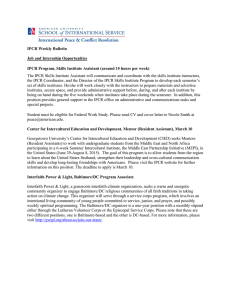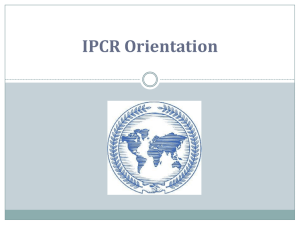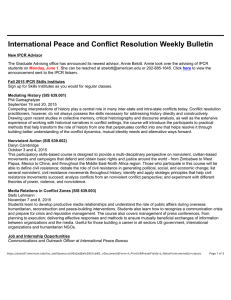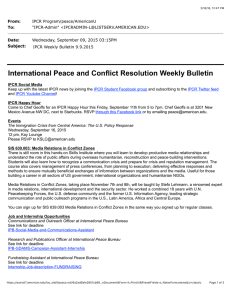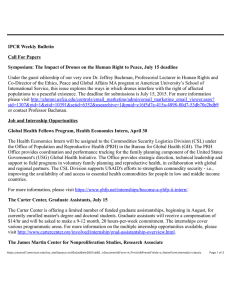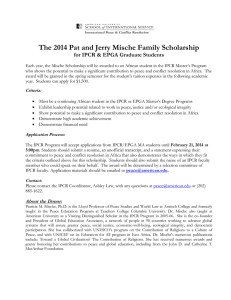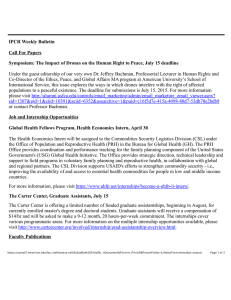Program Assessment Plan American University
advertisement
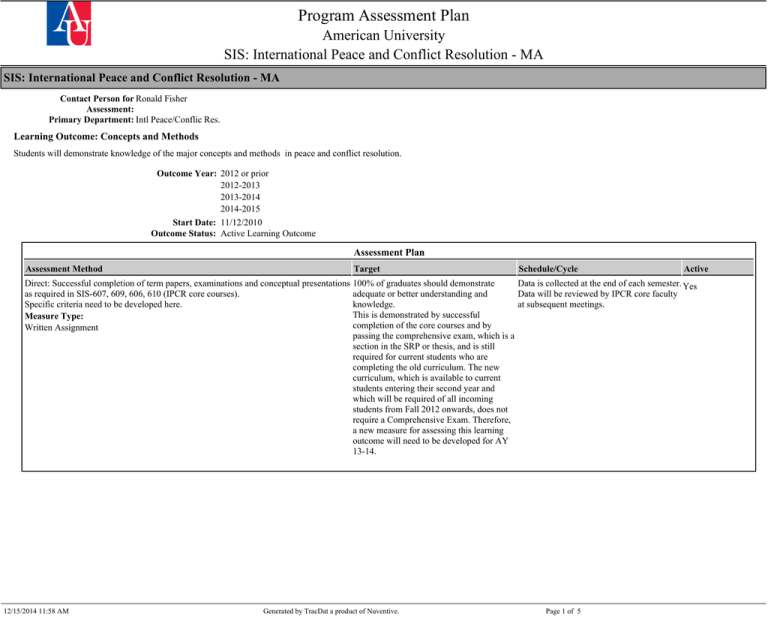
Program Assessment Plan American University SIS: International Peace and Conflict Resolution - MA SIS: International Peace and Conflict Resolution - MA Contact Person for Ronald Fisher Assessment: Primary Department: Intl Peace/Conflic Res. Learning Outcome: Concepts and Methods Students will demonstrate knowledge of the major concepts and methods in peace and conflict resolution. Outcome Year: 2012 or prior 2012-2013 2013-2014 2014-2015 Start Date: 11/12/2010 Outcome Status: Active Learning Outcome Assessment Plan Assessment Method Target Schedule/Cycle Active Direct: Successful completion of term papers, examinations and conceptual presentations 100% of graduates should demonstrate Data is collected at the end of each semester. Yes as required in SIS-607, 609, 606, 610 (IPCR core courses). Data will be reviewed by IPCR core faculty adequate or better understanding and Specific criteria need to be developed here. knowledge. at subsequent meetings. This is demonstrated by successful Measure Type: completion of the core courses and by Written Assignment passing the comprehensive exam, which is a section in the SRP or thesis, and is still required for current students who are completing the old curriculum. The new curriculum, which is available to current students entering their second year and which will be required of all incoming students from Fall 2012 onwards, does not require a Comprehensive Exam. Therefore, a new measure for assessing this learning outcome will need to be developed for AY 13-14. 12/15/2014 11:58 AM Generated by TracDat a product of Nuventive. Page 1 of 5 Assessment Plan Assessment Method Target Schedule/Cycle Active Indirect Measure: Feedback from students at IPCR Annual Retreats and Town Hall Meetings, specifically on the effectiveness of the core courses in imparting the basics of the field. Measure Type: Other Data is collected annually. General satisfaction with the coverage of Yes Data will be reviewed by IPCR core faculty PCR concepts and methods in the core at subsequent meetings. courses was expressed at the 2011 IPCR Annual Retreat on April 15. At the 2012 IPCR Annual Retreat on April 13, 2012, continuing concern was expressed over the redundancy of some topics in the core courses, and a working group of faculty, students and staff Identified the specific redundancies and recommended dropping SIS 610, Theories of Violence and War, as a required core course. This information was reviewed at an IPCR Core Faculty Meeting on May 8, 2012, and the decision was made to delete SIS 610 as a required core course, and to move any coverage of essential, major concepts and methods to the other three core courses (SIS 607, 609 and 606). Subsequently, the Program Director sent a memo on July 19, 2012 to all instructors of the core courses identifying the topics to be moved from 610 to each of the other three core courses. At the IPCR Annual Retreat in April, 2013, students expressed general satisfaction with this change and with the overall state of learning and teaching in the IPCR program, in part with reference to the core courses which impart the major concepts and methods on the field. Related Courses - SIS-606 - Culture and Peace and Conflict Resolution - SIS-607 - Peace Paradigms - SIS-609 - Conflict Analysis and Resolution: Theory and Practice - SIS-610 - Theory of Conflict, Violence and War Related Action Steps * Supporting Assessment: Indiredt Measure: Feedback from students at Annual Retreat. Description: The information from the Annual Retreat was reviewed at an IPCR Core Faculty Meeting on May 8, 2012, and the decision was made to delete SIS 610 as a required core course, and to move any coverage of essential, major concepts and methods to the other three core courses (SIS 607, 609 and 606). Subsequently, the Program Director sent a memo on July 19, 2012 to all instructors of the core courses identifying the topics to be moved from 610 to each of the other three core courses. Learning Outcome: Specialized Knowledge Students will acquire knowledge in an area of concentration (stream) within their degree program. Outcome Year: 2012 or prior 2012-2013 2013-2014 2014-2015 12/15/2014 11:58 AM Generated by TracDat a product of Nuventive. Page 2 of 5 Start Date: 11/12/2010 Outcome Status: Active Learning Outcome Assessment Plan Assessment Method Target Schedule/Cycle Active Students are now required to complete the IPCR CAP (Candidate Academic Plan) form which lays out the courses and rationale for their area of concentration. The development of Learning Outcomes for each area of concentration will enable the development of measures to assess this Outcome. Learning Outcomes for each of the six areas of concentration were developed by faculty in those areas during the 2010-2011 academic year, and were discussed at the IPCR Annual Retreat in April and subsequently finalized for usage. Measure Type: Other 100% of graduates are required to declare and complete an area of concentration (related field, area of concentration, or unique concentration) as part of their degree program. CAP forms are completed by first year Yes students during the Spring or Summer semester with the advice of the IPCR Graduate Adviser and a Faculty Member in their area of concentration if necessary. Learning Outcome: Research Projects Students will develop and execute research projects integrating theory and analysis. Outcome Year: 2012 or prior 2012-2013 2013-2014 2014-2015 Start Date: 11/12/2010 Outcome Status: Active Learning Outcome Assessment Plan Assessment Method Target Schedule/Cycle Active Direct measure: Assessment of the quality of Substantial Research Papers and Theses: 100% of graduates will distribute on the 5- Data is collected at the end of each semester Yes point scale with 75% in the very good to Faculty supervisors will rate SRPs and Theses on a 5-point scale on the quality of and will be reviewed by IPCR core faculty integrating theory and data analysis from outstanding (5) to satisfactory (1). Starting with outstanding categories. at subsequent meetings. 5. Outstanding the 2011-2012 academic year, this rating scale has been added to the Comprehensive Exam Form to be filled out at the completion of the student's Substantial Research Paper 4. Excellent 3. Very Good or Thesis, so that faculty supervisors can automatically record their rating which will 2. Good then be compiled with all the ratings at the end of the academic year for reporting purposes. Beginning with the 2013-2014 academic year, the Comprehensive Exam has 1. Satisfactory been dropped from program requirements, and therefore the comp form measure will no longer be possible. An alternative method of collecting data on the quality of integrating theory and data analysis will need to be developed. Given that the practicum has been added to the program as a new capstone option, the new measure will have to be applied to this option as well as the SRP and the thesis. Measure Type: Written Assignment Indirect measure: Feedback from students at IPCR Annual Retreat and Town Hall Meeting, specifically on the research experience. Measure Type: Other 12/15/2014 11:58 AM General satisfaction with the research Data is collected annually and will be experience by students and faculty at the reviewed by IPCR core faculty at IPCR Annual Retreat. At this past April's subsequent meetings. retreat (2012), discussion focused on confirming several research competencies that were developed as sub outcomes to the Research Projects Learning Outcome. Generated by TracDat a product of Nuventive. Page 3 of 5 Yes Learning Outcome: Communication Skills Students will demonstrate their writing and speaking skills so they can clearly and effectively convey their knowledge. Outcome Year: 2012 or prior 2012-2013 2013-2014 2014-2015 Start Date: 11/12/2010 Outcome Status: Active Learning Outcome Assessment Plan Assessment Method Target Schedule/Cycle Students in core courses should demonstrate The IPCR Program intends to develop a standardized evaluation mechanism to assess the ability to make verbal, media-assisted student presentations in the core courses, both for individuals and team presentations. Results from the evaluations will then be shared and discussed at faculty meetings with a presentations of course material or case view to improving student presentations. At the 2012 Annual Retreat, a working group of material in a manner that follows the faculty and students discussed how to improve both student class presentations and the guidelines and results in affirmative and useful feedback on the template. guidelines and feedback that faculty provide following presentations. The group reviewed a number of feedback templates and generated some proposed guidelines for presentations. Subsequently, the Program Director called on faculty to provide further examples of guidelines and feedback templates for consideration. Based on this information, a standard set of guidelines was developed and approved by IPCR Faculty at a 2013 program meeting (deposited in Tracdat documents). A standard assessment template needs to be developed for use in core courses, and other courses at the discretion of the instructor. Measure Type: Presentation Active Yes Learning Outcome: Foreign Language Students will demonstrate the capacity to speak, write and read a foreign language. Outcome Year: 2012 or prior 2012-2013 2013-2014 2014-2015 Start Date: 11/12/2010 Outcome Status: Active Learning Outcome Assessment Plan Assessment Method Target Schedule/Cycle The IPCR Program is not responsible for assessing this Learning Outcome. Yes Learning Outcome: Economics Theory Students will be able to apply concepts and theories from international economics to issues of peace and mass violence. Outcome Year: 2012 or prior 2012-2013 2013-2014 12/15/2014 11:58 AM Generated by TracDat a product of Nuventive. Active Page 4 of 5 2014-2015 Start Date: 11/12/2010 Outcome Status: Active Learning Outcome Assessment Plan Assessment Method Target This outcome is currently assessed by the completion of SIS-619, Economics of Violence No measure identified. and Peace or related courses in Economics. There is a need to develop a more specific learning outcome and assessment measures. Measure Type: Written Assignment 12/15/2014 11:58 AM Generated by TracDat a product of Nuventive. Schedule/Cycle Active No target identified. Yes Page 5 of 5
